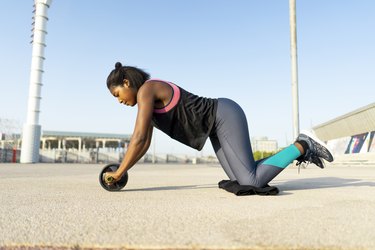
The ab wheel is one of the best bang-for-your-buck pieces of exercise equipment you can find. It's inexpensive, but very effective for strengthening your core and tightening your midsection. It's even used for people with lower limb loss as an effective way to build abs, says Rehab Research.
A lot of ab exercises fall short when it comes to total core activation. Your core involves a lot more than your abs, says Harvard Health Publishing. Several muscles through your hips and glutes surround and stabilize your torso. This is your core. And the ab wheel is a simple tool that allows you to use the entire core to maximize your results.
Video of the Day
Video of the Day
This quick and simple plan is all you need to use the ab wheel to level up your ab game.
Find space on the floor to set up. You'll want an ab wheel and a mat for your knees. Make sure you set up so that the wheel rolls on the floor, not the mat.
1. The Ab Wheel Rollout
Proper form is critical in ab roller exercises for beginners for both safety and maximum core development. The goal is to activate the core. But when done incorrectly, the ab wheel can put stress and strain on your back and hip flexors.
Setting up for using the ab wheel should look a lot like a push up from your knees.
HOW TO DO IT: Grab the wheel with a double overhand grip, holding it underneath your shoulders. Keep a straight line from your shoulders down to your knees, meaning your abs are tight, not sagging.
Squeeze your glutes and roll the wheel in front of your body, keeping your hips extended during the exercise. This ensures the focus stays on your core instead of the hip flexors. Your rectus abdominus and obliques see to contract isometrically, says ExRx.net.
Keep your arms straight and your core tight as you roll forward until your nose is barely off the floor. Reverse the movement to return to the starting position. Complete three sets of eight to 12 reps.
2. The Oblique Rollout
HOW TO DO IT: Setting up is the same — knees on the floor, hips extended and elbows locked out with the roller beneath you. Keep your abs tight and extend your arms, rolling out diagonally until your nose nearly touches the floor.
Roll back to the original starting position before rolling out in the opposite direction. Complete three sets of four to six reps on each side.
3. The Pike Rollout
HOW TO DO IT: Set up by standing with both feet on the floor and placing the wheel on the floor about a foot in front of you. Bend forward as if you were doing a toe touch to grip the wheel.
Roll forward into a push-up position and reverse the movement. Complete two sets of five to eight reps.
Tip
Take this move to the next level by rolling forward until your nose is barely off the floor. Buckle up; going deep on a pike rollout is no joke.
Stretch After Rolling
Finish off your ab roller workout routine by stretching your abs, obliques and back:
1. High Cobra
HOW TO DO IT: Lying on your stomach, push up onto your hands so that your torso comes off the floor. Keep your hips down to stretch your abs. Hold for about 15 seconds.
2. Side Bows
HOW TO DO IT: Lie on your side and grab both of your feet behind you. You should feel the stretch in your hamstrings, hips and abs. Hold for about 15 seconds on each side.
3. Spine Rolls
HOW TO DO IT: Lying on your back, bring your knees to your chest. Wrap your arms around your legs, as if giving yourself a bear hug. Roll from the top of your spine to the bottom. Perform five reps.
Tip
- Ab wheels can be difficult. Only roll as deeply as you can with perfect form.
- When it comes to form, your hips don’t lie. Keep your hips extended to optimize core activation.
- As you get stronger, increase the number of reps or sets.